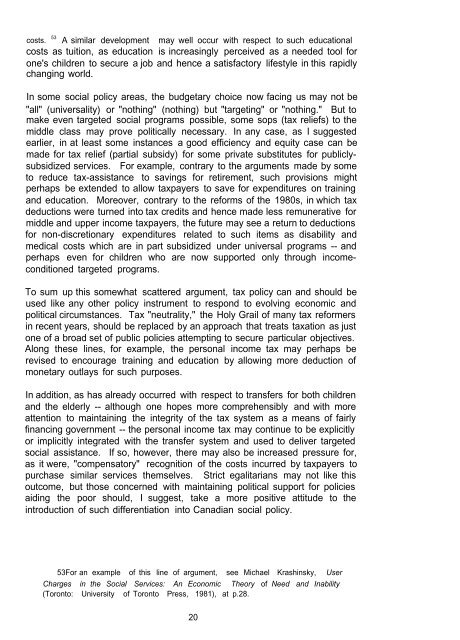Richard Bird - Institute for Public Economics - University of Alberta
Richard Bird - Institute for Public Economics - University of Alberta
Richard Bird - Institute for Public Economics - University of Alberta
You also want an ePaper? Increase the reach of your titles
YUMPU automatically turns print PDFs into web optimized ePapers that Google loves.
53costs. A similar development may well occur with respect to such educationalcosts as tuition, as education is increasingly perceived as a needed tool <strong>for</strong>one's children to secure a job and hence a satisfactory lifestyle in this rapidlychanging world.In some social policy areas, the budgetary choice now facing us may not be"all" (universality) or "nothing" (nothing) but "targeting" or "nothing." But tomake even targeted social programs possible, some sops (tax reliefs) to themiddle class may prove politically necessary. In any case, as I suggestedearlier, in at least some instances a good efficiency and equity case can bemade <strong>for</strong> tax relief (partial subsidy) <strong>for</strong> some private substitutes <strong>for</strong> publiclysubsidizedservices. For example, contrary to the arguments made by someto reduce tax-assistance to savings <strong>for</strong> retirement, such provisions mightperhaps be extended to allow taxpayers to save <strong>for</strong> expenditures on trainingand education. Moreover, contrary to the re<strong>for</strong>ms <strong>of</strong> the 1980s, in which taxdeductions were turned into tax credits and hence made less remunerative <strong>for</strong>middle and upper income taxpayers, the future may see a return to deductions<strong>for</strong> non-discretionary expenditures related to such items as disability andmedical costs which are in part subsidized under universal programs -- andperhaps even <strong>for</strong> children who are now supported only through incomeconditionedtargeted programs.To sum up this somewhat scattered argument, tax policy can and should beused like any other policy instrument to respond to evolving economic andpolitical circumstances. Tax "neutrality," the Holy Grail <strong>of</strong> many tax re<strong>for</strong>mersin recent years, should be replaced by an approach that treats taxation as justone <strong>of</strong> a broad set <strong>of</strong> public policies attempting to secure particular objectives.Along these lines, <strong>for</strong> example, the personal income tax may perhaps berevised to encourage training and education by allowing more deduction <strong>of</strong>monetary outlays <strong>for</strong> such purposes.In addition, as has already occurred with respect to transfers <strong>for</strong> both childrenand the elderly -- although one hopes more comprehensibly and with moreattention to maintaining the integrity <strong>of</strong> the tax system as a means <strong>of</strong> fairlyfinancing government -- the personal income tax may continue to be explicitlyor implicitly integrated with the transfer system and used to deliver targetedsocial assistance. If so, however, there may also be increased pressure <strong>for</strong>,as it were, "compensatory" recognition <strong>of</strong> the costs incurred by taxpayers topurchase similar services themselves. Strict egalitarians may not like thisoutcome, but those concerned with maintaining political support <strong>for</strong> policiesaiding the poor should, I suggest, take a more positive attitude to theintroduction <strong>of</strong> such differentiation into Canadian social policy.53For an example <strong>of</strong> this line <strong>of</strong> argument, see Michael Krashinsky, UserCharges in the Social Services: An Economic Theory <strong>of</strong> Need and Inability(Toronto: <strong>University</strong> <strong>of</strong> Toronto Press, 1981), at p.28.20



